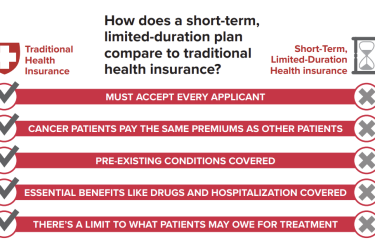
Blue Cross Blue Shield of Massachusetts announced this week that it is taking the radical step of paying to keep patients out of the hospital.
In a partnership with South Shore Health System in Weymouth, Mass., BCBSM will change the financial reward system so that it will tie payments to health system to its success in collaborating with physicians to improve quality, patient outcomes and costs for the patients they physicians and health system. Under BCBSM’s Alternative Quality Contract (AQC), the health insurer will reward the health system and physicians for their success in doing so, the two parties said in an Oct. 30 news release.
We have covered the AQC in the past. See, for example, this blog post about results from its global-payment contract in 2014, and this write up by Priyanka Dayal McCluskey of a presentation BCBSM President and CEO Andrew Dreyfus made at the Health Journalism 2013 conference in Boston.
On Monday, McCluskey wrote about BCBSM’s latest strategy to contain costs and improve quality, explaining that under this new effort, the health insurer is moving away from fee-for-service payment for hospital care. Instead of paying hospitals for every patient they admit and every procedure they do, BCBSM is paying for how well the health system controls costs while keeping patients healthy, she wrote.

Earlier this year, BCBSM began testing the idea with South Shore Hospital and expects to offer the program to other Massachusetts hospitals in 2020, McCluskey reported.
“Hospitals would be rewarded when they collaborate with physician groups — even physicians affiliated with a different hospital — to manage costs and improve patient outcomes,” she added. “Blue Cross launched a similar payment program for physicians about a decade ago. But the business model for hospitals is still largely rooted in the old fee-for-service system.”
This effort from BCBSM follows a model adopted in Maryland, as Jay Hancock explained for Kaiser Health News and the Baltimore Sun earlier this year.
“Maryland essentially pays hospitals to keep people out of the hospital,” Hancock wrote. “Analysts often describe the change as the most far-reaching attempt in the nation to control the medical costs driving up insurance premiums and government spending.”
In March, the Maryland’s Health Services Cost Review Commission and the Maryland Department of Health reported that payment system saved the Medicare program $586 million in hospital-related costs over three years, he added.
Health policy experts say fee-for-service payment gives providers a financial incentive to deliver more care regardless of need. One alternative is value-based payment or models such as accountable care organizations, McCluskey explained. Under BCBSM’s new arrangement, a hospital would have an incentive not to admit a patient who comes to the emergency room but instead could call that patient’s doctor to make a follow-up appointment, she added.
Health journalists know that rural and other hospitals are closing as reimbursement declines and that hospitals already struggle to do what administrators say is their mission: keep heads in beds. Under a payment system designed to keep patients out of the hospital, the question to ask is: How do hospitals remain open and viable in their communities?







